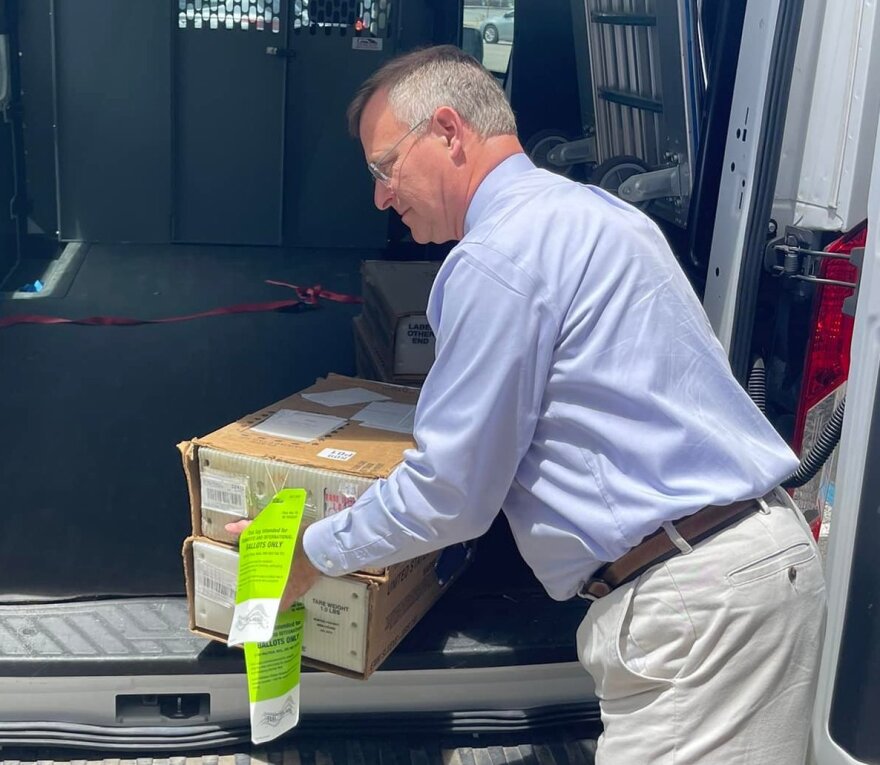As voters prepare to cast their ballots in the upcoming primaries and general election, Florida’s 67 elections supervisors are getting their ducks in a row.
In time for the midterms, including his own reelection bid, Gov. Ron DeSantis signed a number of new balloting laws including an elections police force which he believes to be the way to restore voter confidence.
“And the fact of the matter is when people see something that they think may violate the law if you call the supervisor of elections — they’re not investigators, they’re not law enforcement,” said the governor. “But what are you gonna do, you call a state attorney’s office? They do other crimes. Some of them may not care as much about the election stuff.”
Other new laws seek to change the state's congressional map and ban counties from passing rules allowing voters to rank candidates by preference. Ranking candidates, instead of voting for just one, eliminates the need for runoff elections.
“We just want to make sure that whatever laws are on the books that those laws are enforced; and that if people know that we’re gonna enforce the law I think people will be very happy,” DeSantis said.
“There are quite a few [new laws], but to probably start out with is vote-by-mail; there are some new requirements when requesting a ballot,” said Tappie Villane, the elections supervisor in Santa Rosa County. She adds that voters now must give additional information to prove they are who they are.
“Either a Florida driver’s license number, a Florida ID number, and/or the last four of their Social [Security number],” she said. “Also, if someone makes a request this year, then it will only be good for one election cycle. It used to be where it was two election cycles.”
Drop boxes in Santa Rosa will still be available, at elections offices in Milton and Gulf Breeze.

“We have never had our drop boxes outside; people have always had to come into your office location and drop those off,” Villane said. “So that will be the same, and then of course when early voting starts, they will be able to drop off their vote-by-mail ballot during early voting hours at our different locations.”
And by the way, “ballot boxes” have a new name, thanks to the state. They’re now called “secure ballot intake stations.”
Many of those new laws, for the most part, are not expected to affect voting that much in Northwest Florida, Paul Lux, Okaloosa County’s elections chief, said. One case in point is Senate Bill 90, regarding drop boxes and providing food and water to those in line to vote, within the 150-foot no solicitation zone.
“We never had a 24-hour drop box in Okaloosa County," said Lux. "The drop boxes were already inside our buildings. And I don’t think I’ve ever had a line get anywhere near the 150 ft. zone, never mind had people who were waiting in line so long that they were worried about food and water.”
At the grassroots level, Lux says he and Florida’s other 66 elections supervisors need the public’s help in getting out the right voting information.
“We are seeing a lot of misinformation out there, and a lot of disinformation being spread around," Lux added. "If you hear or you see people doing something or saying something that you know is not correct or you think is worrisome, call your supervisor of elections. We are the trusted source for information about elections in Florida.”
One current trend in the elections process across Florida is the increased use of the U.S. Postal Service to vote. Lux says in 2020, at the height of the pandemic, many were reluctant to vote in person.
“There was still a lot of uncertainty, people who had underlying conditions; we didn’t have a vaccine,” he said. “My suspicion is that a lot of people who voted by mail may revert back to voting early or going to the polls — if they were used to voting in person before.”
This is the first election cycle under the 2020 Census, which is expected to bring about some administrative challenges, according to Escambia County’s David Stafford, who points to the number of single-member districts here.

“For county commission, for school board, for [Emerald Coast Utilities Authority], and for the city of Pensacola,” Stafford said. “In addition, of course, to the state legislative seats. Our neighboring counties, Santa Rosa and Okaloosa, most of their districts, if not all, are at-large.”
One of the higher-profile bills passed by the Legislature and signed into law by the governor sets up an elections police force to investigate any signs of fraud. Stafford says until now, possible cases have been referred to state attorneys’ offices.
“We’ve done so in the past and will continue to do so in the future,” he said. “Now, if we’re talking about a more concentrated effort to look beyond that – and have specific personnel dedicated to investigating and prosecuting – we’ll see what that looks like.”
As far as turnout, Stafford says historically, non-presidential election years tend to be lighter for the primaries, and for the general election — even the ones when a governor is elected. But he adds that he’s hoping for the same robust turnout seen four years ago.
“In 2018, I think it took some people by surprise a bit," said Stafford. "We’re anticipating again a healthy turnout, maybe a little above what you’re seen in years past, not taking 2018 out of the equation. I think people are paying attention and that you’ll see a healthy turnout and we’ll certainly be ready for it.”
Meanwhile, vote-by-mail ballots are being sent overseas to military and ex-pat civilians from Florida. They can be mailed in or sent by fax, and must be received by 7 p.m. on Primary Day August 23, and at the same time on Election Day, November 8.

